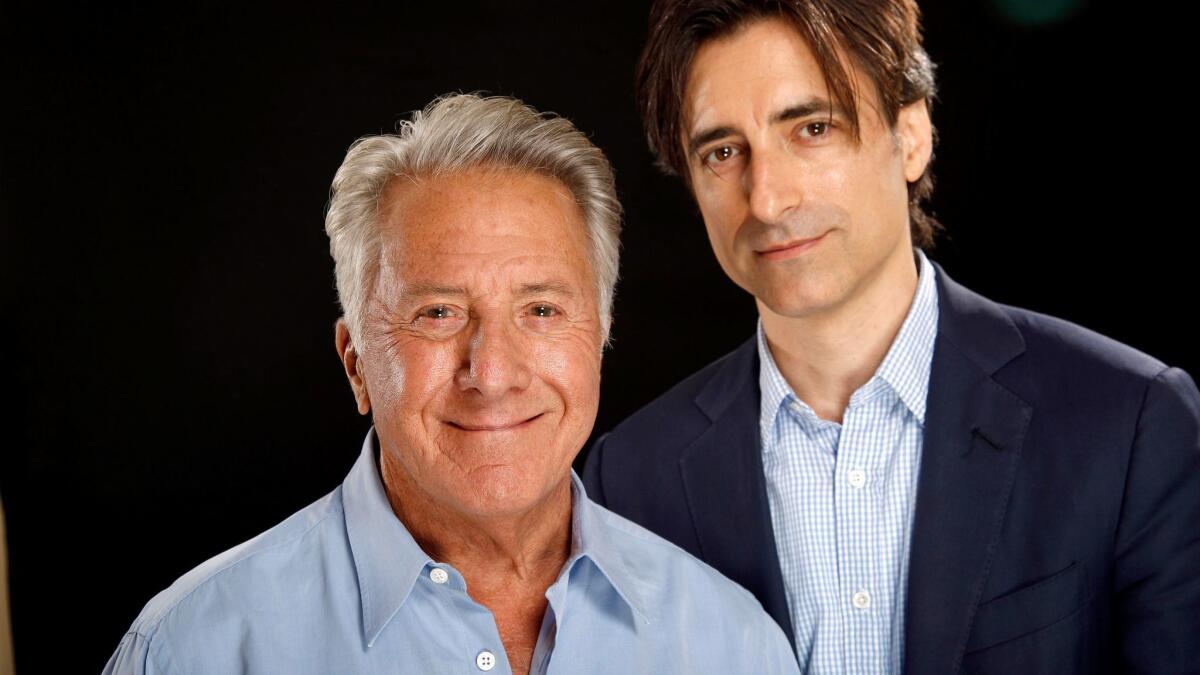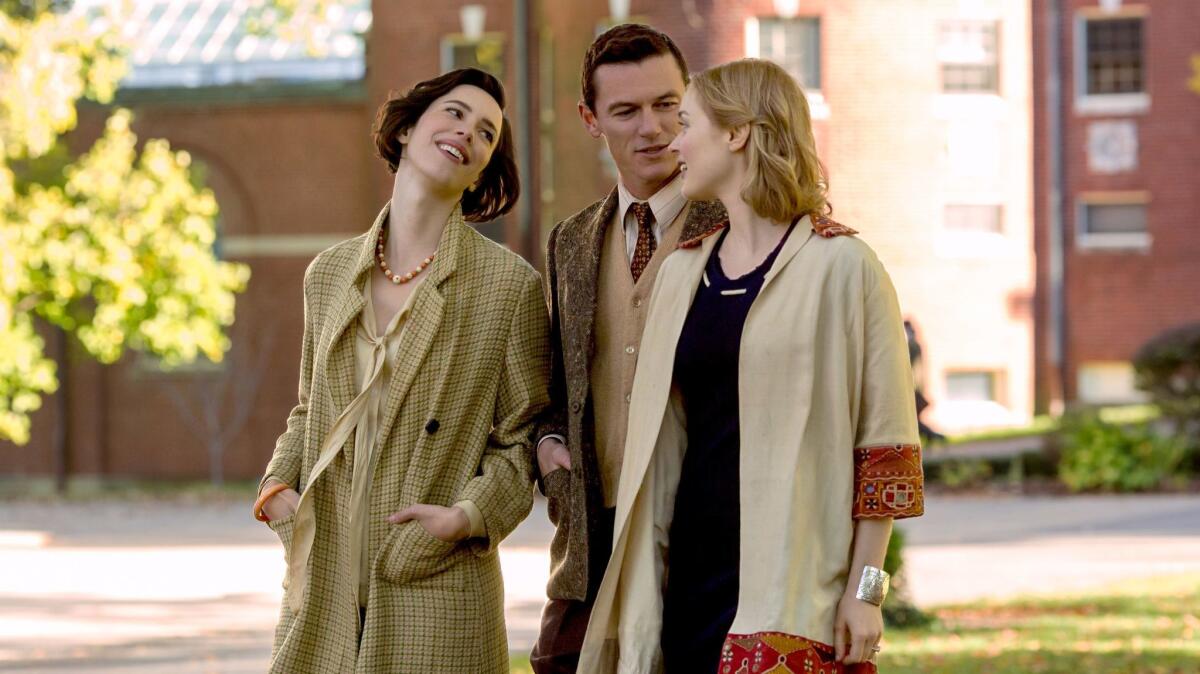Indie Focus: Families and histories with ‘The Meyerowitz Stories,’ ‘Professor Marston’ and ‘Faces Places’

Anyone reading this newsletter is likely already well-informed of the allegations of sexual harassment and sexual assault surrounding disgraced producer and former studio chief Harvey Weinstein. My colleagues Josh Rottenberg and Amy Kaufman wrote a stellar pair of articles this week about the scandal, which captured the dilemma for Hollywood of what to do next and how to move into a future where such people and actions no longer are accepted or enabled.
When the world feels out of control, with one day of anxiety-inducing news after the next, it may seem like horror movies are the last thing one might need. In fact, as our Sunday Calendar package on the state of modern horror puts forward, anxious times call for anxious movies.
Justin Chang takes a look at how the success of movies like “Get Out” and “It” signal how horror has been revitalized in the era of Donald Trump. As he put it, “We crave the comfort of the familiar and reject the possibility of the unknown. In life, as in art, we get the horrors we deserve.”
Jen Yamato looked at the ways in which horror can be seen as a storytelling language all its own, talking to a stellar lineup of filmmakers John Carpenter, Mike Flanagan, Mick Garris, Coralie Fargeat, Stuart Gordon, Don Coscarelli, Roxanne Benjamin, Neil Marshall, Ti West and Dario Argento on how they learned to speak it.
Kenneth Turan wrote about his falling out with horror films, how he can’t watch them anymore because “on the most basic level, the horror on the screen feels real to me. I can’t get to the place where it’s all aestheticized into an art object. That’s not one of my options. I can’t get past the surface horrors — they scare me too much in the middle of the night, and I don’t enjoy the sensation.”
And I spoke to Guillermo del Toro specifically about the similarities and differences of working with horror in movies, television and books. “What I find really interesting as a storyteller is that each of those mediums informs the other,” he said.
‘The Meyerowitz Stories (New and Selected)’
The latest from writer-director Noah Baumbach — a filmmaker who is an acknowledged favorite around these parts — “The Meyerowitz Stories (New and Selected)” finds him bringing together Ben Stiller, Adam Sandler, Dustin Hoffman, Emma Thompson and Elizabeth Marvel in a serio-comic story of a family learning to get along.
In his review of the film, Kenneth Turan called the movie “funny, moving and psychologically complex” before adding that it “feels very much from the heart. It has an unexpected maturity and warmth, a compassion that seems to reflect Baumbach’s desire to dig as deeply as he can into the myriad conundrums of family life. And, as noted, it is often quite funny.”
I spoke to Baumbach, Sandler, Stiller and Hoffman about their seeming dream-team collaboration. As Sandler said of his hard work and dedication toward his own deeply felt, emotionally open performance, “knowing what it meant to Noah and how deeply it affected me reading it and my fellow actors, I just knew it was a special moment.”
At the New York Times, Glenn Kenny noted, “With this film, Mr. Baumbach has achieved a near-perfect balance between engagement and discomfort. In ‘The Squid and the Whale’ and ‘Margot at the Wedding,’ something drove him to depict family squabbles with a candor that approached cruelty. … As boisterous and edgy as ‘The Meyerowitz Stories’ gets, it is a more mellow film, and to my eyes and ears all the better for it.”
At Vulture, Emily Yoshida added, “ ‘Meyerowitz’ is not afraid to let its characters hug and learn, and the film ends on a note that is almost radically hopeful after all the vitriol and baggage we’ve seen up until then. And yes, this unhappy movie family ends on a kind of elliptical, life-goes-on note that so many unhappy movie families have ended on before. But what a lovely note that is.

‘Professor Marston and the Wonder Women’
Written and directed by Angela Robinson, “Professor Marston and the Wonder Women” tells the origin story of the character of Wonder Woman. The film explores the complex relationship between William Moulton Marston, Elizabeth Marston and Olive Byrne, as played with Luke Evans, Rebecca Hall and Bella Heathcote, respectively.
In his review for The Times, Justin Chang noted that between the three leads, “The erotic tension is literally off the charts. … So, too, is the on-screen chemistry.”
He added: “The spirited, populist appeal of Wonder Woman is partly what allowed her to remain such a playful paradox: a pinup and a pioneer, an object of desire and an avatar of empowerment wrapped up (so to speak) in one. In similar fashion, ‘Professor Marston and the Wonder Women’ embraces its own contradictions.”
I spoke to Robinson ahead of the film’s recent world premiere. Of the phenomenal screen chemistry between her three leads she said, “It’s rare that you meet three people who come together who are all as committed. It’s just the three of them in so many scenes together. I wanted the drama to come from every little look or touch or thought or how they were reacting to each other.”
At the New York Times, Manohla Dargis wrote, “The movie gleams and has all the smooth surfaces and persuasive detail of a typical period picture — the fedoras, the rides, the Katharine Hepburn trousers. All that luster, which too often in movies suggests polite manners and drowsily safe entertainment, proves to be a seductive, glossy way into something more satisfyingly complicated.”
At the Washington Post, Anne Hornaday added, “As the movie we need right now, ‘Professor Marston and the Wonder Women’ could not be better timed. News reports might be awash in abuses of authority and grievous misconduct within the movie industry, but here’s a story that not only celebrates female power and open-minded idealism, but also embodies those values in its very warp and woof.”
‘Faces Places’
Among those receiving an honorary Oscar at next month’s Governors Awards is Agnès Varda. There is something particularly delightful that at 89, Varda also has a new movie out. (It may even be competitive for this year’s documentary prizes.) Co-directed with the artist known as JR, her new film “Faces Places” is a travelogue in which the two traverse the French countryside. (But it’s a lot more than just that.)
For The Times, Justin Chang wrote of the film’s vivid, emotional finale that “Varda, with the combination of rigor, spontaneity and generosity that has become her artistic signature, gives herself over fully to the emotion of the moment, embracing the beauty of what she has seen and, in the same instance, all that there still is to see.”
Email me if you have questions, comments or suggestions, and follow me on Twitter @IndieFocus
More to Read
Only good movies
Get the Indie Focus newsletter, Mark Olsen's weekly guide to the world of cinema.
You may occasionally receive promotional content from the Los Angeles Times.










